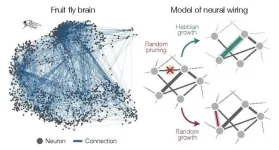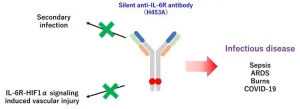(Press-News.org) Research Highlights:
Consistently high scores of perceived stress during adolescence through adulthood may contribute to worse cardiometabolic health including obesity in young adults..
Researchers suggest the adoption of healthy coping strategies for stress management early in life may help prevent cardiometabolic diseases, from heart disease to Type 2 diabetes.
Embargoed until 4 a.m. CT/5 a.m. ET Wednesday, January 17, 2024
DALLAS, January 17, 2024 — Young adults who reported higher stress during their teenage years to adulthood were more likely to have high blood pressure, obesity and other cardiometabolic risk factors than their peers who reported less stress, according to new research published today in the Journal of the American Heart Association, an open access, peer-reviewed journal of the American Heart Association.
Cardiometabolic risk factors often occur together and are a significant cause of cardiovascular disease. These include obesity, Type 2 diabetes or prediabetes, high cholesterol and high blood pressure, researchers noted.
Understanding the effects of perceived stress starting in childhood is important for preventing, lessening or managing higher cardiometabolic risk factors in young adults,” said study author Fangqi Guo, Ph.D., postdoctoral research fellow at Keck School of Medicine, University of Southern California, Los Angeles.
“Our findings suggest that perceived stress patterns over time have a far-reaching effect on various cardiometabolic measures including fat distribution, vascular health and obesity,” Guo said. “This could highlight the importance of stress management as early as in adolescence as a health protective behavior.”
In 2020, cardiometabolic diseases, including cardiovascular diseases and Type 2 diabetes, were the most prevalent chronic health conditions and collectively accounted for nearly a quarter of all deaths in the U.S., according to the American Heart Association statistics. In 2023, the American Heart Association noted the strong connections among cardiovascular disease, kidney disease, Type 2 diabetes and obesity, and suggested redefining cardiovascular risk, prevention and management.
Childhood adversities affect cardiometabolic health across the life course, and interventions that improve early exposures may be more appropriate than interventions for cardiovascular disease risk factor effects later in life, according to a 2017 American Heart Association Scientific Statement: Childhood and Adolescent Adversity and Cardiometabolic Outcomes. In recent decades, researchers have found that perceived stress is a risk factor for cardiometabolic health conditions.
For this study, researchers analyzed health information from the Southern California Children’s Health Study. Participants had enrolled in the study as children along with their parents, then participated in follow-up assessments as adolescents — average age 13 — and as young adults — average age 24.
At each stage, stress was measured with a 4-item Perceived Stress Scale, a questionnaire about feelings and thoughts during the last month. Study participants were categorized into four risk-based groups: consistently high stress over time, decreasing stress over time, increasing stress over time and consistently low stress over time.
To evaluate cardiometabolic risk in young adulthood, Guo and colleagues used measures of carotid artery intima-media thickness (measures neck artery thickness); systolic (top number) and diastolic (bottom number) blood pressure; weight, percentage of body fat and fat distribution; and hemoglobin A1c. Hemoglobin A1c gauges blood sugar over time; increased thickness of the neck artery’s inner layers suggests blood may not be flowing smoothly; and more fat around the abdomen is associated with a higher risk of cardiovascular diseases and/or Type 2 diabetes.
The analysis found:
Consistently high perceived stress from adolescence through adulthood was associated with greater risk for cardiometabolic diseases in young adulthood. If individuals experienced greater levels of stress from their teenage years into adulthood, they were more likely to have worse vascular health, higher total body fat, more fat around the belly and higher risk of obesity compared to those who felt less stressed over time.
In general, higher perceived stress levels were also associated with higher risk for cardiometabolic health conditions. For example, adults who experience higher levels of stress tended to have worse vascular health and higher systolic and diastolic blood pressure.
“Although we assumed that perceived stress patterns should have some association with cardiometabolic measures, we did not expect such consistent patterns across various risk factors,” Guo said.
“Health care professionals should consider using the Perceived Stress Scale to evaluate individuals’ stress levels during clinic visits. This way, those with higher stress levels can be identified and receive treatment earlier.”
Study details, background or design:
Researchers reviewed data on 276 people from Southern California communities participating in the Southern California Children’s Health Study. Participants enrolled as children from 2003 to 2014 and took part in follow-up health assessments as adults from 2018 to 2021.
About 56% of participants were girls/women; 62% identified as white; 5% as Asian; 1% as either Black or Native American; and 13% were classified as “other.” About 47% identified as Hispanic.
Researchers investigated perceived stress reported by participants’ parents during childhood (average age of about 6 years); then by participants, themselves, in adolescence (average age about 13 years); and then again in young adulthood (average age nearly 24 years).
A limitation was the study’s relatively small size. Studies with more participants would help clarify the results.
Co-authors, disclosures and funding sources are listed in the manuscript.
Studies published in the American Heart Association’s scientific journals are peer reviewed. The statements and conclusions in each manuscript are solely those of the study authors and do not necessarily reflect the Association’s policy or position. The Association makes no representation or guarantee as to their accuracy or reliability. The Association receives funding primarily from individuals; foundations and corporations (including pharmaceutical, device manufacturers and other companies) also make donations and fund specific Association programs and events. The Association has strict policies to prevent these relationships from influencing the science content. Revenues from pharmaceutical and biotech companies, device manufacturers and health insurance providers and the Association’s overall financial information are available here.
Additional Resources:
Multimedia is available on the right column of release link https://newsroom.heart.org/news/childhood-stress-linked-to-higher-risk-of-high-blood-pressure-obesity-diabetes-in-adults?preview=50d8b89970ff0563f9c1682e1f106e84
After Jan. 17, 2024, view the manuscript online.
AHA health information: Help Teens Cope with Stress
AHA health information: 3 Tips to Manage Stress
AHA news release: Depression, anxiety and stress linked to poor heart health in two new studies (Nov. 2023)
AHA news release: Feeling loved, optimistic or happy as a teen may lead to better health in adulthood (Jan. 2023)
Follow AHA/ASA news on X (formerly known as Twitter) @HeartNews
Follow news from the Journal of the American Heart Association @JAHA_AHA
###
About the American Heart Association
The American Heart Association is a relentless force for a world of longer, healthier lives. We are dedicated to ensuring equitable health in all communities. Through collaboration with numerous organizations, and powered by millions of volunteers, we fund innovative research, advocate for the public’s health and share lifesaving resources. The Dallas-based organization has been a leading source of health information for a century. During 2024 - our Centennial year - we celebrate our rich 100-year history and accomplishments. As we forge ahead into our second century of bold discovery and impact, our vision is to advance health and hope for everyone, everywhere. Connect with us on heart.org, Facebook, X or by calling 1-800-AHA-USA1.
END
Childhood stress linked to higher risk of high blood pressure, obesity, diabetes in adults
Young adults who reported higher stress as adolescents were more likely to have high blood pressure, obesity and other cardiometabolic risk factors as adults, finds new study in Journal of the American Heart Association.
2024-01-17
ELSE PRESS RELEASES FROM THIS DATE:
US air pollution rates on the decline but pockets of inequities remain
2024-01-17
Over the last decades, air pollution emissions have decreased substantially; however, the magnitude of the change varies by demographics, according to a new study by Columbia University Mailman School of Public Health. The results indicate there are racial/ethnic and socioeconomic disparities in air pollution emissions reductions, particularly in the industry and energy generation sectors. The findings are published in the journal Nature Communications.
The research provides a national investigation of air pollution emission ...
Fly brain, mouse brain, worm brain: They all network the same
2024-01-17
New York, January 17, 2024 — In all species, brain function relies on an intricate network of connections that allows neurons to send information back and forth between one another, commanding thought and physical activity. But within those networks a small number of neurons share much stronger connections to one another than all the others. These abnormally strong connections—known as “heavy tailed” based on the shape of their distribution—are thought to play an outsized role in brain function.
Researchers ...
Surprisingly simple model explains how brain cells organize and connect
2024-01-17
A new study by physicists and neuroscientists from the University of Chicago, Harvard and Yale describes how connectivity among neurons comes about through general principles of networking and self-organization, rather than the biological features of an individual organism.
The research, published on January 17, 2024 in Nature Physics, accurately describes neuronal connectivity in a variety of model organisms and could apply to non-biological networks like social interactions as well.
“When you’re building simple models to ...
Transforming clinical recording of deep brain activity with a new take on sensor manufacturing
2024-01-17
Sensors built with a new manufacturing approach are capable of recording activity deep within the brain from large populations of individual neurons–with a resolution of as few as one or two neurons–in humans as well as a range of animal models, according to a study published in the Jan. 17, 2024 issue of the journal Nature Communications. The research team is led by the Integrated Electronics and Biointerfaces Laboratory (IEBL) at the University of California San Diego.
The approach is unique in several ways. It relies on ultra-thin, flexible and customizable probes, made of clinical-grade materials, and equipped with sensors that can record extremely localized ...
Role of inherited genetic variants in rare blood cancer uncovered
2024-01-17
Large-scale genetic analysis has helped researchers uncover the interplay between cancer-driving genetic mutations and inherited genetic variants in a rare type of blood cancer.
Researchers from the Wellcome Sanger Institute, the University of Cambridge, and collaborators, combined various comprehensive data sets to understand the impact of both cancer-driving spontaneous mutations and inherited genetic variation on the risk of developing myeloproliferative neoplasms (MPN).
The study, published today (17 January) in Nature Genetics, describes how inherited genetic variants can influence whether a spontaneous mutation in a particular ...
AI model predicts death, complications for patients undergoing angioplasty, stents
2024-01-17
When a person has one or more blocked arteries, providers may choose to conduct a minimally invasive procedure known as percutaneous coronary intervention, or PCI.
By inflating a balloon and potentially placing a stent, blood can flow more freely from the heart.
Despite carrying less risk than open surgery, stenting and balloon angioplasty can result in complications like bleeding and kidney injury.
Researchers at Michigan Medicine developed an AI-driven algorithm that accurately predicts death and complications after PCI — which could emerge as a tool ...
E-cigarettes help pregnant smokers quit without risks to pregnancy
2024-01-17
A new analysis of trial data on pregnant smokers, led by researchers at Queen Mary University of London, finds that the regular use of nicotine replacement products during pregnancy is not associated with adverse pregnancy events or poor pregnancy outcomes.
The PREP 2 study used data collected from over 1100 pregnant smokers attending 23 hospitals in England and 1 stop-smoking service in Scotland to compare pregnancy outcomes in women who did or did not use nicotine in the form of e-cigarettes (EC) or nicotine patches ...
John Innes Centre researcher honored with prestigious Blavatnik award
2024-01-17
The pioneering research of Dr Yiliang Ding investigating the structure and function of RNA in living cells has been recognised with a major award.
Yiliang a group leader at the John Innes Centre, is among nine recipients of the 2024 Blavatnik Awards for Young Scientists in the UK, announced today by the Blavatnik Family Foundation and The New York Academy of Sciences.
The awards recognise research that is transforming medicine, technology, and our understanding of the world across three categories: Chemical Sciences, Physical Sciences & Engineering, and ...
Mass-producible miniature quantum memory
2024-01-17
Researchers at the University of Basel have built a quantum memory element based on atoms in a tiny glass cell. In the future, such quantum memories could be mass-produced on a wafer.
It is hard to imagine our lives without networks such as the internet or mobile phone networks. In the future, similar networks are planned for quantum technologies that will enable the tap-proof transmission of messages using quantum cryptography and make it possible to connect quantum computers to each other.
Like their conventional counterparts, such quantum networks require memory elements in which information can be temporarily stored ...
A new targeted treatment calms the cytokine storm
2024-01-17
Osaka, Japan – Cytokines are chemical messengers that help the body get rid of invading bacteria and viruses, and control inflammation. The body carefully balances cytokines because they help keep the immune system healthy. However, this balance is upset if the immune system overreacts. A serious infection or a severe burn can unleash a cytokine storm in the body. During the storm—also called cytokine release syndrome (CRS)—the body produces too many cytokines, leading to life-threatening inflammation.
Interleukin-6 (IL-6) is a key cytokine in the storm because it helps to drive the inflammation that damages ...
LAST 30 PRESS RELEASES:
Husker researchers collaborate to explore fear of spiders
Mayo Clinic researchers discover hidden brain map that may improve epilepsy care
NYCST announces Round 2 Awards for space technology projects
How the Dobbs decision and abortion restrictions changed where medical students apply to residency programs
Microwave frying can help lower oil content for healthier French fries
In MS, wearable sensors may help identify people at risk of worsening disability
Study: Football associated with nearly one in five brain injuries in youth sports
Machine-learning immune-system analysis study may hold clues to personalized medicine
A promising potential therapeutic strategy for Rett syndrome
How time changes impact public sentiment in the U.S.
Analysis of charred food in pot reveals that prehistoric Europeans had surprisingly complex cuisines
As a whole, LGB+ workers in the NHS do not experience pay gaps compared to their heterosexual colleagues
How cocaine rewires the brain to drive relapse
Mosquito monitoring through sound - implications for AI species recognition
UCLA researchers engineer CAR-T cells to target hard-to-treat solid tumors
New study reveals asynchronous land–ocean responses to ancient ocean anoxia
Ctenophore research points to earlier origins of brain-like structures
Tibet ASγ experiment sheds new light on cosmic rays acceleration and propagation in Milky Way
AI-based liquid biopsy may detect liver fibrosis, cirrhosis and chronic disease signals
Hope for Rett syndrome: New research may unlock treatment pathway for rare disorder with no cure
How some skills become second nature
SFU study sheds light on clotting risks for female astronauts
UC Irvine chemists shed light on how age-related cataracts may begin
Machine learning reveals Raman signatures of liquid-like ion conduction in solid electrolytes
Children’s Hospital of Philadelphia researchers emphasize benefits and risks of generative AI at different stages of childhood development
Why conversation is more like a dance than an exchange of words
With Evo 2, AI can model and design the genetic code for all domains of life
Discovery of why only some early tumors survive could help catch and treat cancer at very earliest stages
Study reveals how gut bacteria and diet can reprogram fat to burn more energy
Mayo Clinic researchers link Parkinson's-related protein to faster Alzheimer's progression in women
[Press-News.org] Childhood stress linked to higher risk of high blood pressure, obesity, diabetes in adultsYoung adults who reported higher stress as adolescents were more likely to have high blood pressure, obesity and other cardiometabolic risk factors as adults, finds new study in Journal of the American Heart Association.




